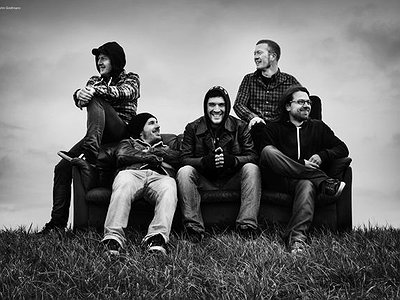When did you start writing/producing music - and what or who were your early passions and influences?
That’s a long time ago! The first serious steps were at the end of the 90s when I had a band together with Sebastian Heldt and Tobias Buck from Neaera. We were pretty into New Metal, Crossover, Grunge and Punk Rock stuff at that time and listened to bands like the Deftones, Korn, Rage Against The Machine, Staind, Limp Bizkit, Nirvana, Green Day, Millencolin, etc... So they were the main influences at that time. And of course all of us were wearing baggy pants...
What do you personally consider to be the incisive moments in your artistic work and/or career?
I think one of the best moments was when I woke up one day and had a complete piece of music with two guitars, bass and drum lines in my head. The cool thing about it was that I really liked it!
What are currently your main compositional- and production-challenges?
I think that the next challenge for us as a band should be not to record an album by overdubbing, but to play all the songs simultaneously in one room, to ramp the internal communication and intensity up one step further. I think it’s essential to capture the energy as you play together and to catch those spontaneous moments. Working on that!
What do you usually start with when working on a new piece?
Usually it’s one riff or a melody that one of us brings into the rehearsal room. Sometimes it’s like a domino that you just have to knock over to get the whole thing started. After that we try a lot of things by improvising and implementing concrete ideas. So the songs develop piece by piece.
How strictly do you separate improvising and composing?
Not at all I’d say, because improvising is the most important element while composing. Often the intuitive moments are the most emotional because you just play without thinking about it and you do just what feels right at that moment. It's really strange sometimes because after playing you often ask yourself, "how could I came up with such a lick, riff or melody?" that you wouldn’t expect from yourself. They are great moments.
How do you see the relationship between sound, space and composition?
I think that for me nothing can disturb a good composition but sound is a great and important tool to amplify the atmosphere and emotions that you want to carry in a song so we pay a lot of attention to sound and composition.
Do you feel it important that an audience is able to deduct the processes and ideas behind a work purely on the basis of the music? If so, how do you make them transparent?
In the best case it should be exactly like that but then the writer and the listener have to match perfectly in their musical socialisation. That’s mostly not the case so we try to complete our message with our artwork and titles. But what I like about instrumental music on the other hand is that your journey is not fully determined while you’re listening to that kind of music, so you are able to let it flow and to see where it carries your feelings and thoughts. You kind of listen to yourself.
In how much, do you feel, are creative decisions shaped by cultural differences – and in how much, vice versa, is the perception of sound influenced by cultural differences?
A lot of music was written because of differences within cultures in the past. But the huge amount of homogenous social groups with similar problems and interests are splitting into a lot of smaller social groupings with only a few interferences. And that’s a development you can see in music, too. There is a strong connection, as the arts in general works like a mirror of society.



